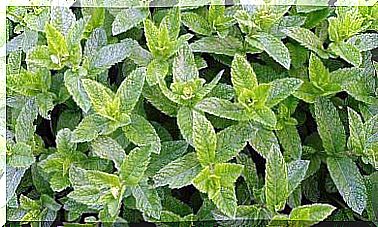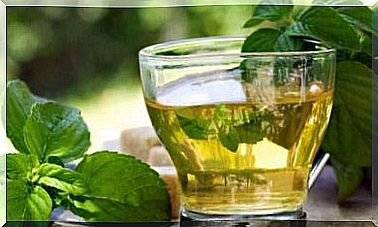Medicinal Plants For Chronic Gastritis
Did you know that aloe vera can also help you take care of your gastric health? Thanks to its properties it protects the stomach and reduces acidity.

There are many people who suffer from chronic gastritis today, as it is very common and in short, it is due to a bad combination of stress, poor eating habits and also lack of exercise.
In a study carried out by the University of Navarra Clinic, it is shown that there are still no extensive epidemiological studies of chronic gastritis in Spain that can be applied to the entire population, although it is known that the incidence increases with age.
It also points out that since it was accepted that the main etiological agent is Helicobacter pylori , there are studies on infection by this germ. Most infected patients have some degree of chronic gastritis, so data on the disease can be deduced by analyzing H. pylori prevalence studies.
In the following article, you will find some tips and also a selection of some natural alternatives that could help treat chronic gastritis.
What should we know about gastritis?
Based on this Mayo Clinic research, it can be said that it is a general term used to refer to a group of diseases that have one thing in common: inflammation of the stomach lining.
This study also states that gastritis inflammation is generally caused by the same bacterial infection that causes most stomach ulcers. Frequent use of certain pain relievers and drinking too much alcohol can also contribute to gastritis.
In turn, it can be classified into:
- Acute gastritis: It is sudden and temporary.
- Chronic gastritis: It lasts over time and is more frequent than the previous one.
On the other hand, the symptoms of gastritis can vary from one person to another, but the most frequent are:
- Stomachache.
- Sickness.
- Vomiting
- Indigestion.
- Abdominal swelling
- Intolerance to certain foods.
- Loss of appetite
What are the causes of gastritis?
As we have already said, gastritis is the inflammation of the lining of the stomach and that protects it from the acidity of gastric juices. The same study cited above, also explains that the causative factors can be multiple:
- Dairy products (especially whole).
- High fat diet.
- Low fiber foods.
- Caffeine.
- Helicobacter Pylori bacteria.
- Certain medications (such as aspirin or anti-inflammatories).
- Alcohol.
- Tobacco.
- Sensitivity to certain foods.
- Spicy foods
- Very spicy meals.
- Pernicious anemia (when vitamin B12 is not well absorbed).
- Gastric reflux.

Some natural alternatives for chronic gastritis
Although this disease is very common and affects millions of people around the world, natural alternatives can help reduce symptoms. Basically, the plants that treat gastritis can be grouped according to their properties:
- Anti-inflammatory : reduce swelling and irritation.
- Demulcent : protect the gastric mucosa.
- Tonic-digestive: they strengthen the stomach.
- Antacids: decrease the production of stomach acid.
Among the most recommended we find:
Chamomile
Chamomile (C hamaemelum nobile) is a plant that has long been used to soothe stomach discomfort. There are many properties that this characteristic flower plant has. It can be highlighted that it is anti-inflammatory, protective and also helps to repair the gastric membrane. This makes it a natural alternative suitable for any stomach problem.
Ingredients:
- 1 tablespoon of chamomile (15 g) or 2 bags.
- 1 cup of water (250 ml).
preparation:
It is super simple, because it is prepared like many infusions. You just have to boil the water and then add the chamomile. Subsequently, you should let infusions for a period of 3 to 5 minutes. Finally, you can drink up to 3 cups a day. It is suggested to sweeten with 1 tablespoon of honey per cup. It gives it a delicious flavor.
aloe vera
Also known as aloe, it is a plant known for its protective properties of the skin, but it is also very good for improving the health of the gastric mucosa.
Helps soften and protect the stomach, as well as reduce acidity. You can consume the juice that is bought in the diet, although it is also sold in drops or tablets.
Marjoram
Another good option is this herb, it is digestive and at the same time an excellent stomach tonic.
Ingredients:
- 1 tablespoon of dried marjoram flowers and leaves (15 g)
- 1 cup of water (250 ml)
preparation:
Boil the water and add the herbs. Let it infuse for 5 minutes, strain and drink. Simple truth?
Boldo
Boldo ( Peumus boldus) is one of the most popular plants to treat gastritis, it is due to its properties that promote stomach health. Thanks to one of its components, cineole, it has the ability to protect the mucous membranes of the stomach. However, it is very important to note that boldo treatments are not indicated for more than 4 consecutive weeks.
Ingredients:
- 1 teaspoon of dried leaves (5 g)
- 1 cup of water (250 ml)
preparation:
Make the infusion as usual. You can drink up to 3 times a day, always after the main meals.

Sage
This plant is widely used to relieve heartburn. It has very good properties to improve the symptoms of chronic gastritis. Like the previous ones, it contributes in a positive way in the treatment against chronic gastritis.
Ingredients:
- A tablespoon of dried sage leaves (15 g)
- 1 liter of water
preparation:
Boil the water and add the leaves of the plant. Let cool for 5 minutes. Filter and drink throughout the day.
Rosemary
If you want to promote digestion and avoid pain caused by inflammation of the stomach walls, rosemary ( Salvia rosmarinus) is advisable to consume up to 2 cups of tea from this plant, always after lunch and dinner.
Ingredients:
- 1 teaspoon of dried rosemary leaves (5 g)
- 1 cup of water (250 ml)
preparation:
Simple. Brew like any other tea and drink before it gets cold. It is suggested to prepare only the amount to be drunk, so that it will not be reheated in the microwave later.
Mallow
It has a large amount of mucilage and protects the gastric mucosa.
Ingredients:
- 1 tablespoon of dried mallow flowers and leaves (10 g)
- 1 cup of water (250 ml)
preparation:
Put everything in a saucepan and then boil for 10 minutes. Remove from the heat, cover and let it rest for a few minutes. Filter and drink with a tablespoon of honey. It is suggested to drink up to 2 cups per day.
Hibiscus
It belongs to the same family as mallow, therefore it has similar properties. It is also often used to treat high blood pressure or to fight infections.
Ingredients:
- 1 teaspoon of the plant (10 g)
- 1 cup of water (250 ml)
preparation:
Heat the water until it boils, add the hibiscus and let it infuse for 5 minutes. Then strain it and it is ready to drink.
Other plants rich in mucilage that can help you are:
- purple
- Flax

How to avoid chronic gastritis?
Surely if you have already had an episode of acute gastritis, you will not want to suffer it again (and much less have it become chronic gastritis). Therefore, pay attention to these tips:
- Follow a fixed schedule and always eat at the same times.
- Chew your food well and eat slowly.
- Eliminate soft drinks (sodas) from your diet.
- Avoid drinking alcohol and smoking.
- Eat a proper breakfast every morning (with cereals, dairy, fruits).
- Eat citrus in moderation
- Avoid very strong spices (pepper, curry, cumin).
- Eliminate excessively greasy foods from your diet.
- Watch your medication intake and look for alternatives if you don’t like them.
- Eat yellow and green vegetables (rich in antioxidants).
- Eat 5 meals a day.
- Cut down on salt in your meals.
- Drink yogurt for its contribution of probiotics.
- Get moderate physical activity 2-3 times a week.
- Decrease stress levels.
- Don’t always eat fast food: choose more homemade and natural menus.










